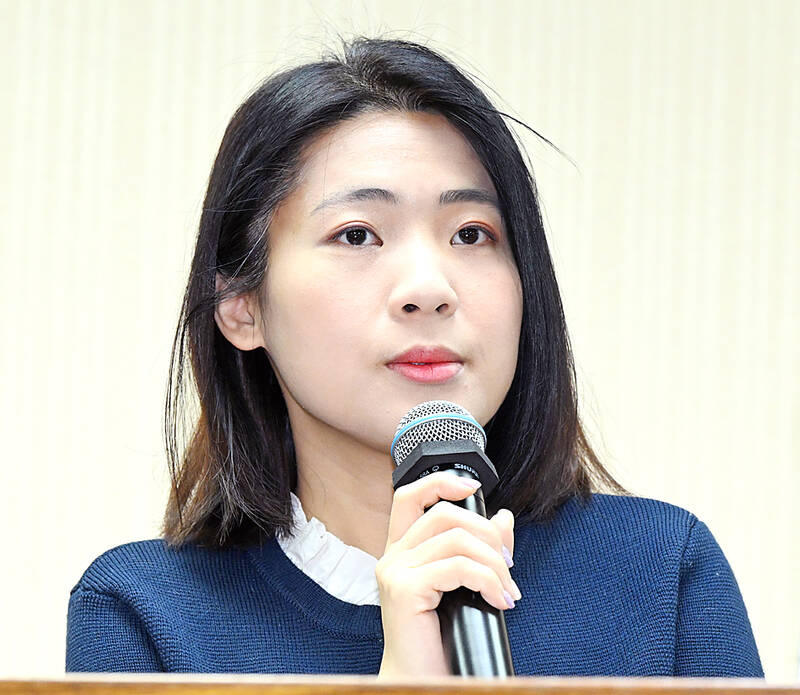The Ministry of Foreign Affairs rebutted allegations of dishonest handling of donations, after Chinese Nationalist Party (KMT) Legislator Hsu Chiao-hsin (徐巧芯) said on Thursday last week that the ministry had been dishonest about its cooperation with Lithuania and the Czech Republic in offering assistance to Ukraine.
The monetary donation made by Taiwan in these partnerships was allegedly handled by political sponsors or persons with special political influence in the partner countries, she said, questioning how much money was actually sent to help Ukraine.
The ministry said on Saturday that the accusations were “groundless, based on imagination and untrue,” adding that they discredited the efforts of ministry officials, harmed Taiwan’s like-minded partners in Europe and severely damaged the nation’s international image.

Photo: Liao Chen-huei, Taipei Times
The cooperative projects between Taiwan and its partners in providing humanitarian assistance to Ukraine have all gone through strict reviews and were “open and transparent,” the ministry added.
Hsu made additional statements against the ministry in a Facebook post yesterday, saying that it signed secretive agreements with a Czech medical device supplier under the pretense of aiding Ukraine.
Taiwan put US$10 million into a healthcare aid project with the Czech Republic to assist Ukraine, which would be carried out by the Czech Health Technology Institute, Hsu said.
Hsu asked about the fairness of the project, as it was signed a few months after institute chairman Petr Foit visited Taiwan in March last year, adding that her questions are all based on “concrete information.”
The Taipei Economic and Cultural Office in Prague and the Czech Economic and Cultural Office in Taipei signed a memorandum of understanding (MOU) in December last year to establish a three-year partnership to help rebuild Ukraine’s primary healthcare system, the ministry said yesterday.
The MOU also states that 30 to 40 percent of the donation made by Taiwan would be used to purchase medical supplies from Taiwanese manufacturers to promote commercial engagement between the two countries, the ministry said.
The Czech government designated the institute to carry out the project, which would be supervised by the two offices, it said.
After signing the MOU, the ministry submitted it to the Legislative Yuan according to the Conclusion of Treaties Act (條約締結法) and issued a press release announcing the project, the ministry said.

A preclearance service to facilitate entry for people traveling to select airports in Japan would be available from Thursday next week to Feb. 25 at Taiwan Taoyuan International Airport, Taoyuan International Airport Corp (TIAC) said on Tuesday. The service was first made available to Taiwanese travelers throughout the winter vacation of 2024 and during the Lunar New Year holiday. In addition to flights to the Japanese cities of Hakodate, Asahikawa, Akita, Sendai, Niigata, Okayama, Takamatsu, Kumamoto and Kagoshima, the service would be available to travelers to Kobe and Oita. The service can be accessed by passengers of 15 flight routes operated by

Alain Robert, known as the "French Spider-Man," praised Alex Honnold as exceptionally well-prepared after the US climber completed a free solo ascent of Taipei 101 yesterday. Robert said Honnold's ascent of the 508m-tall skyscraper in just more than one-and-a-half hours without using safety ropes or equipment was a remarkable achievement. "This is my life," he said in an interview conducted in French, adding that he liked the feeling of being "on the edge of danger." The 63-year-old Frenchman climbed Taipei 101 using ropes in December 2004, taking about four hours to reach the top. On a one-to-10 scale of difficulty, Robert said Taipei 101

Taiwanese and US defense groups are collaborating to introduce deployable, semi-autonomous manufacturing systems for drones and components in a boost to the nation’s supply chain resilience. Taiwan’s G-Tech Optroelectronics Corp subsidiary GTOC and the US’ Aerkomm Inc on Friday announced an agreement with fellow US-based Firestorm Lab to adopt the latter’s xCell, a technology featuring 3D printers fitted in 6.1m container units. The systems enable aerial platforms and parts to be produced in high volumes from dispersed nodes capable of rapid redeployment, to minimize the risk of enemy strikes and to meet field requirements, they said. Firestorm chief technology officer Ian Muceus said

MORE FALL: An investigation into one of Xi’s key cronies, part of a broader ‘anti-corruption’ drive, indicates that he might have a deep distrust in the military, an expert said China’s latest military purge underscores systemic risks in its shift from collective leadership to sole rule under Chinese President Xi Jinping (習近平), and could disrupt its chain of command and military capabilities, a national security official said yesterday. If decisionmaking within the Chinese Communist Party has become “irrational” under one-man rule, the Taiwan Strait and the regional situation must be approached with extreme caution, given unforeseen risks, they added. The anonymous official made the remarks as China’s Central Military Commission Vice Chairman Zhang Youxia (張又俠) and Joint Staff Department Chief of Staff Liu Zhenli (劉振立) were reportedly being investigated for suspected “serious